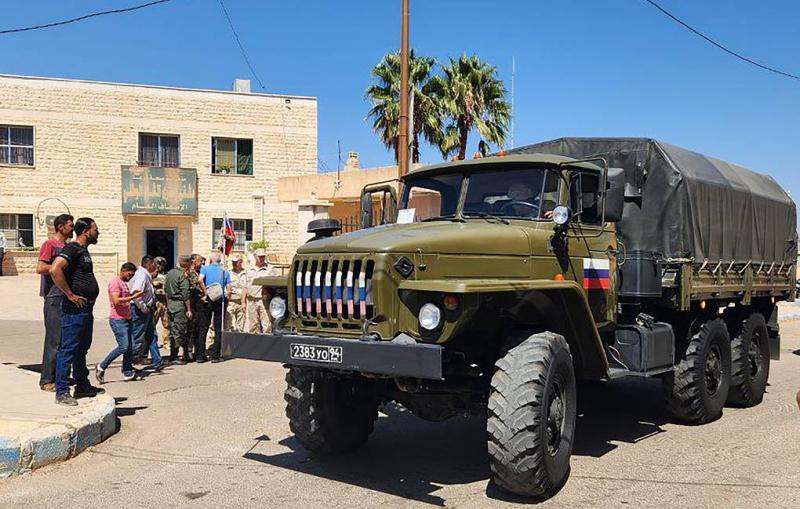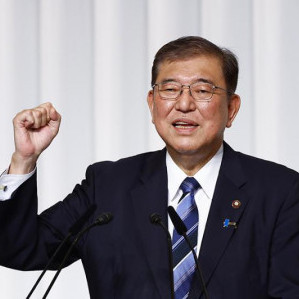
- Press review: Israel and Hamas near a truce while Zelensky drafts a new negotiation plan
- Press review: Who benefits from Russian general's murder as Trump lacks Kremlin strategy
- Press review: EU imposes new anti-Russian sanctions and Russia braces for NATO conflict
- Press review: South Korean president impeached as Ukraine turns to foreign mercenaries
Would Russia maintain its military footprint in Syria, the UN's possibility of convening a Security Council summit, and Kiev's indication that it could host foreign troops before joining NATO. These stories topped Tuesday's newspaper headlines in Russia.
Vedomosti: Would Russia maintain its military footprint in Syria
Maintaining Russia’s military presence in Syria will be "a very important issue" in talks with the Arab republic’s new government, Kremlin Spokesman Dmitry Peskov told reporters on Monday. According to him, it is too early to discuss holding such talks amid the political transition process and extreme instability. His comment came amid rumors that Russia had allegedly withdrawn most of its troops from the country after the regime of Syrian President Bashar Assad fell on December 8 and continued fighting on the border between Syria and Turkey.
In an interview with Al Arabiya television on the previous day, former Syrian Prime Minister Mohammad Ghazi al-Jalali, who stayed in Damascus, stated that it would be up to the next administration to decide the presence of Russian troops in Syria. The Russian Foreign Ministry said on December 8 that even though the Russian military sites "are on increased alert, there is no serious threat to their security."
For the time being, no threat is being posed to the Russian military facilities in Syria, indeed, Ibragim Ibragimov, a researcher at the Russian Academy of Sciences’ Institute of World Economy and International Relations, told Vedomosti. He believes that the Russian military will stay in the republic in the near future. "I don’t exclude that a new format of military-technical cooperation will appear soon and that Russian military instructors will play a role in establishing a new Syrian army," he added.
According to Middle East expert Ruslan Suleimanov, Russia has a chance to maintain its military footprint in Tartus and Hmeimim, albeit symbolically. "Representatives of HTS (Hay·at Tahrir al-Sham, formerly known as the Nusra Front, outlawed in Russia) have never opposed Russia’s presence in Syria," the expert explained. Nevertheless, he continued, Russia and Syria will hardly maintain a friendly relationship in the current situation. The two countries will likely reduce their ties to spheres of mutual interest, he maintained.
"HTS officials will have to communicate with the international community and seek their removal from the terrorist list anyway. A new period begins in the history of Syria, and Moscow will likely have to establish dialogue with them," Suleimanov concluded.
Izvestia: UN sees a possibility for a Security Council summit
The permanent members of the United Nations Security Council (UNSC) might convene a summit meeting—an idea proposed by Russian President Vladimir Putin—at major venues of the global organization, according to Stephane Dujarric, the spokesman for the UN chief, who spoke to Izvestia. He stated that unity within the Security Council, especially among its permanent members, is critical for maintaining peace and global security. The body, which is supposed to guarantee international stability, currently struggles to reach consensus on most issues. While such a meeting has the potential to pave the way for de-escalation, it appears unlikely in the near future due to disagreements, primarily concerning the Ukraine crisis. However, the return of Donald Trump to power in the United States next year could shift the trajectory of relations between Russia and the West.
"Everything will depend on Trump’s vision of the challenges ahead," American historian and former Harvard University professor Vladimir Brovkin told Izvestia. "What he wants to do inside America will face obstacles if he fails to resolve the Ukraine issue with Putin. Without resolution, escalation will continue, requiring more money, more weapons, and other spending. This could hinder his domestic agenda. If he aims to revitalize US industries, reduce bureaucracy, and reform the government <…>, he will need to address international crises," the expert warned.
The need to revive communication with Russia and bridge the gap between the Western camp and the Global South might become essential for a summit meeting of UNSC leaders. Trump, for his part, could pressure or persuade his European allies, including Britain and France, to tone down their persistent anti-Russian rhetoric and engage in dialogue, Brovkin continued. Given that the UN is open to providing a platform, such a meeting could theoretically be convened as part of the General Assembly High-level Week in 2025. Trump and Putin might even agree to hold such a meeting.
"Trump <…> could act as a global leader. Together [with Putin], they could establish a framework for cooperation among major powers in addressing global challenges," Brovkin surmised. "While no one should feel compelled, this offers prospects for normalization. Especially considering that the UN Security Council possesses significant international influence," he concluded.
Nezavisimaya Gazeta: Zelensky signals Ukraine could host foreign troops before joining NATO
Friedrich Merz, the leader of Germany’s Christian Democratic Union (CDU), recently visited Kiev on a pre-election tour, following in the footsteps of German Chancellor Olaf Scholz. Ukraine’s President Vladimir Zelensky used the occasion to signal Kiev’s readiness to host foreign troops on Ukrainian soil, underscoring the need to bolster Ukraine's defense posture by deploying long-range Taurus missiles. While Merz aimed to demonstrate stronger support for Kiev than his rival Scholz, he sought to avoid appearing overly hawkish to his voters and likely refrained from openly discussing the potential delivery of German long-range missiles to Ukraine, experts suggest.
It is worth noting that, in mid-November, Merz declared he would call on Russia to end hostilities within 24 hours if he were elected, or alternatively, he would authorize the supply of Taurus missiles to Ukraine and lift restrictions on German weapons being used for strikes inside Russia—measures Scholz has consistently opposed.
Stanislav Tkachenko, a professor at the Department of European Studies at the Faculty of International Relations of St. Petersburg State University, told Nezavisimaya Gazeta that during his visit to Kiev, Merz aimed to project a stronger commitment to supporting Ukraine than Scholz, while carefully avoiding an overly aggressive stance. This balancing act was crucial, especially as his earlier statements about Taurus missile supplies had already sparked controversy among German voters.
"Merz sought to walk back his earlier pledges because even the CDU recognizes that the German electorate is increasingly wary of prolonged military involvement in the Russia-Ukraine conflict," Tkachenko explained.
Additionally, Merz is likely to tread cautiously in responding to Zelensky’s appeal for foreign troop deployments in Ukraine. While Merz has previously campaigned for sending German peacekeepers once a peace agreement is reached, he is expected to avoid firm commitments on this front during the current volatile climate. Tkachenko suggested that Zelensky’s rhetoric during the meeting may have also been a strategic response to counter ideas put forward by US President-elect Donald Trump, the expert concluded.
Izvestia: Turkey may benefit from instability in Syria in terms of energy transit
The situation in Syria may redefine energy supply routes to Turkey and Europe, experts interviewed by Izvestia suggest. Ankara stands to gain significantly by establishing a direct route for oil and gas transit via Syria. Previously, longer and more expensive routes bypassing the Arab republic were considered due to political instability. While Syria is not a major supplier of oil and gas, its strategic geographical position makes it vital for commodity transit.
"The political situation in Syria can disrupt regional logistics and trade routes as it serves as a key link in the chain connecting the Middle East, Europe, and Turkey," Vladimir Chernov of Freedom Finance Global explained. However, destroyed infrastructure and sanctions have rendered Syria unsuitable for hosting large-scale transit projects, he noted.
"Amid instability in Syria and its inability to provide secure transit routes, other regional players such as Turkey, Iran, and Iraq are developing alternative corridors for oil supplies," said Farhad Ibragimov, a professor at the Faculty of Economics at the People’s Friendship University of Russia. According to him, Ankara has been heavily investing in pipelines bypassing Syria to reduce reliance on unstable territories.
This shift in Syria’s political landscape comes at a time when the transit of Russian gas to Europe through Ukraine may come to a halt, and amid plans by Russia and Turkey to establish a new gas trading hub in Istanbul as early as next year. The project, proposed by Russia in 2022 in response to sanctions and the sabotage of the Nord Stream pipelines, could further position Turkey as a key energy player. Additionally, if Ankara develops an energy transport route from Qatar via Syria, it could solidify its role as a major gas hub in the region.
The latest US sanctions on Gazprombank, imposed last month, have further complicated matters by disrupting the processing of payments for Russian energy exports to Europe.
Overall, developments in Syria are unlikely to have a severely negative impact on the global economy, but Iran’s involvement could escalate tensions, potentially driving oil prices higher and increasing market volatility, warned Nikolay Dudchenko, an analyst at Finam. Higher oil prices, however, could benefit crude exporters like Russia, enhancing their revenues amidst the global market shifts.
Vedomosti: Russia in talks to sell gigantic radars to India
India is in discussions to purchase a radar from Russia’s Voronezh early warning system under a contract reportedly worth over $4 billion, The Sunday Guardian has revealed. The deal would require India to cover 60% of the radar station's cost, involving over 50 Indian companies in the project. The radar is expected to be constructed in Chitradurga, located in Karnataka on India’s east coast. A defense industry official confirmed the talks to Vedomosti, while a Rosoboronexport representative declined to comment.
Since the mid-2000s, Russia has built seven Voronezh radars, which form a major ground-based component of its domestic early warning system. These radars, capable of detecting ballistic missiles at ranges of up to 8,000 kilometers (4,971 miles), can even track intercontinental missiles.
Russia and India share a close and strategic relationship in military-technical cooperation, noted Alexander Yermakov, an expert at the Russian International Affairs Council. Moscow has also maintained a balance in its relations with both New Delhi and Beijing. President Vladimir Putin previously stated that Russia is helping China develop an anti-missile defense system, Yermakov pointed out.
While the potential deal with India appears plausible, negotiations are likely to remain discreet under current geopolitical circumstances, argued Dmitry Stefanovich, a researcher at the Center for International Security at the Institute of World Economy and International Relations. He described India as a "special and privileged partner" for Russia, noting that military-technical cooperation has thrived for decades despite external opposition.
If the project materializes, it would highlight Russia’s well-balanced approach to military-technical partnerships, enhancing nuclear deterrence both regionally and globally, Stefanovich concluded.
TASS is not responsible for the material quoted in these press reviews









